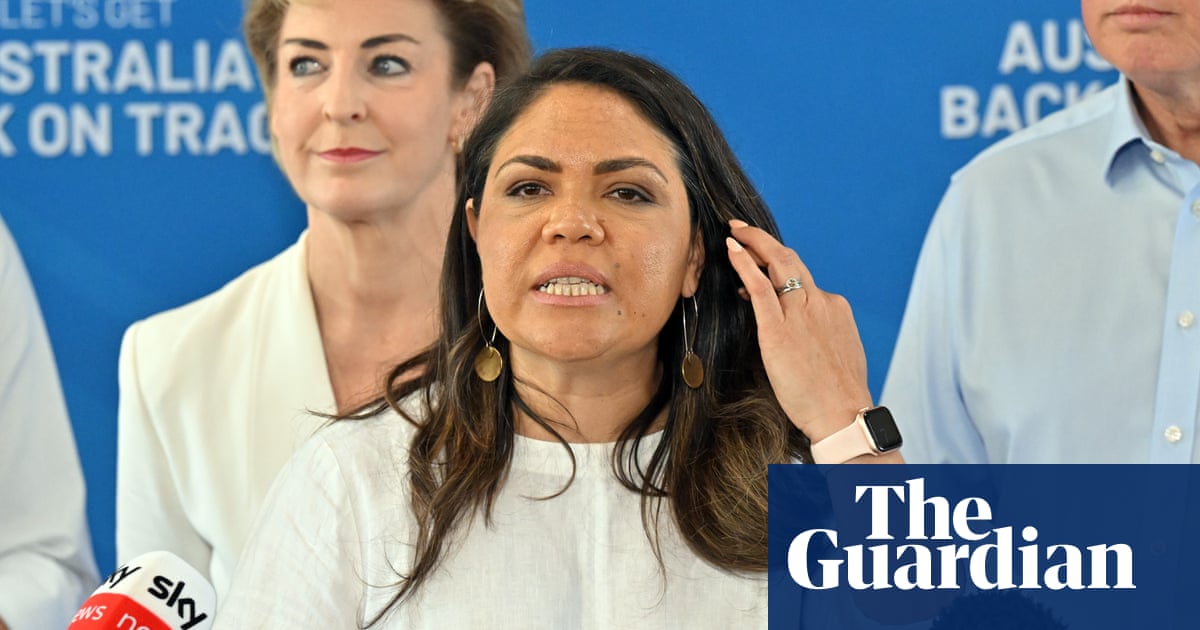The firebrand Northern Territory senatorJacinta Nampijinpa Pricehas defected to the Liberals in a move that could have major implications in the race to replace Peter Dutton.
The Country Liberal senator announced on Thursday she would switch from the Nationals to theLiberal partyroom, where she believed she could be more “effective” in fighting for the “best interests of all Australians”.
As a Country Liberal, Price can choose to sit with either the Nationals or Liberals.
The Nine papers reportedPrice could run as Taylor’s deputy in a leadership ballot with Sussan Ley to replace Dutton, who lost his seat in Saturday’s federal election rout.
Sign up for Guardian Australia’s breaking news email
Sources close to Taylor said on Thursday there was no deal between the pair.
In a post on X, Taylor said he was “delighted” at news Price would join the Liberal party room.
“Jacinta is a tireless advocate for Liberal values and a good friend. Jacinta will be another strong voice at a time the Liberal Party must rebuild,” he wrote.
The manoeuvring comes as momentum builds internally for the Liberal party to abandon or scale back its position on nuclear energy as MPs reveal longstanding doubts over the commitment to taxpayer-funded reactors.
The NSW Liberal senator Dave Sharma became the latest to raise concerns about the Coalition’s contentious policy aftercolleague Maria Kovaciccalled for it to be dumped entirely.
The opposition went to the election vowing to lift the John Howard-era national ban on nuclear power and build reactors at seven sites nationwide.
“I believe nuclear power could play a useful role in our future energy mix, but this is a quite different question to whether the government should be building, owning and operating such assets,” Sharma told Guardian Australia.
“Clearly that element of our policy – the public financing component – was a difficult one to sell.”
The prospect of a Taylor-Price leadership team would represent a shift to the right for the Liberals, which was already battling perceptions of being too rightwing under Dutton.
Price, who has sat in the Nationals party room since entering parliament in 2022, shot to national prominence during the voice to parliament referendum as the public face of the successful no campaign.
In January, Dutton appointed her to a government efficiency portfolio, which drew immediate comparisons with Elon Musk’s Doge in the Trump administration.
Price attracted further comparisons with Trump-style politics during the campaign, declaring she wanted to“make Australia great again”at a rally in Perth.
The possible leadership pairing prompted immediate backlash from Liberal moderates, with one ridiculing Price for seeking the deputy leadership of a party room “she has never sat in”.
“Taylor’s economics and Price’s Maga-Trumpish has just been rejected by voters,” one Liberal MP said.
Another Liberal said the pairing was “not the answer to our woes”.
Sign up toBreaking News Australia
Get the most important news as it breaks
after newsletter promotion
“It is a risk of taking us further from the centre, into fringe issues that we don’t need to be talking about.”
In her statement on Thursday, Price said she was “eager to fight for the best interests of all Australians as part of the Coalition”.
“I want to bring back our core values of liberty, individual freedom and responsibility, the rule of law, free market and economic prosperity, minimal government intervention, a fair go and most of all, love for our nation, Australia.”
The Nationals leader, David Littleproud, said he was disappointed at Price’s defection.
“The Nationals negotiated an extra position in shadow cabinet before the election, to give Senator Nampijinpa Price a promotion and shadow ministerial opportunity,” he said.
“The Nationals were the first to lead the ‘no’ case in relation to the voice, backing Senator Nampijinpa Price early and before anyone else did.
“Our strong stance led to an overwhelming majority of Australians voting no.
“I appreciate Senator Nampijinpa Price has ambition that extends beyond the possibilities of the Nationals and I wish her well.”
On Thursday, Ley received public endorsements from a trio of former Liberal premiers –Jeff Kennett, Nick Greiner and Barry O’Farrell– as momentum builds around the push to make her the first female federal Liberal leader in history.
The public nature of the pro-Ley campaign has irked some Taylor supporters, who believe the process should be played out in private.
“This is not a US primary,” one MP said, referencing the public contest to decide Democrat and Republican presidential candidates.
One of Taylor’s allies downplayed the influence of ex-premiers, arguing none of the endorsements would peel votes off the shadow treasurer.
Sources in both camps believed Ley remained the favourite but insisted the numbers were extremely tight.
